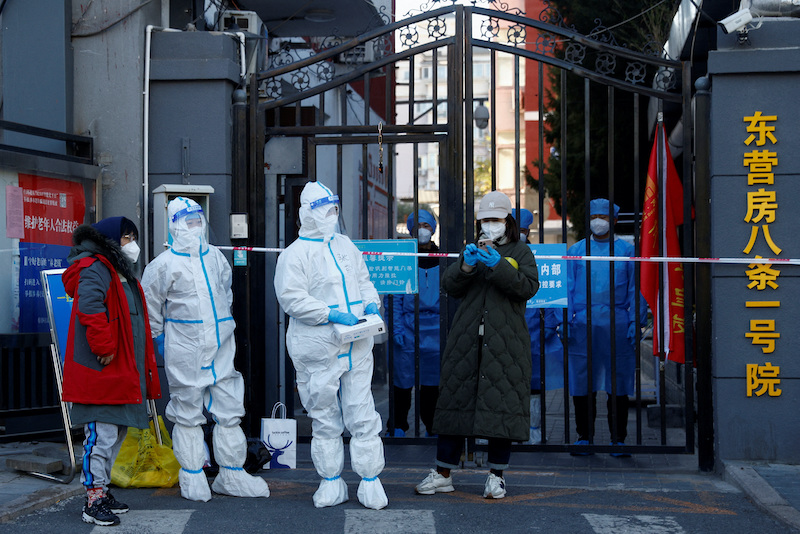Officials in dozens of Chinese cities – from Guangzhou to Wuhan and Xining in the northwest – have implemented Covid lockdowns after the country reported a third day of more than 1,000 new cases nationwide.
Officials have been sealing up buildings, shutting off residential districts – moves that have thrown millions into distress amid a scramble to halt widening outbreaks.
The numbers are modest so far compared with the tens of thousands a day that sent Shanghai into a full-blown lockdown earlier this year but enough to trigger more restrictions across the country.
China‘s coronavirus case load has remained small by global standards, but its ultra-strict and disruptive containment measures this year against the highly transmissible Omicron variant have weighed heavily on the world’s second-largest economy.
As of Monday October 24, some 28 cities were implementing varying degrees of lockdown measures, with around 207.7 million people affected in regions responsible for around 25.6 trillion yuan ($3.55 trillion) of China‘s gross domestic product, according to Nomura.
That is the equivalent of nearly a quarter of China‘s 2021 economic output.
Mainland China shares edged lower on Thursday as the outbreaks and gloomy data on a Covid-battered industrial sector hurt sentiment.
ALSO SEE:
Covid Still Hitting China’s Economy, Limiting Travel, Consumption
Streets Sealed in Guangzhou
On Thursday, Guangzhou, China‘s fourth-biggest city by economic output and the provincial capital of Guangdong, sealed up more streets and neighbourhoods and kept people in their homes as new areas were deemed high-risk in a Covid resurgence that persisted into its fourth week.
“Many of my friends and coworkers have been under lockdown at home,” said Guangzhou resident Lily Li, 28, said.
“The situation is still unstable. Many places are under lockdown. Classes have stopped and entertainment venues have been suspended too. The gym that I often go to has also been closed.”
Wuhan Tells 800,000 to Stay Home
Wuhan, site of the world’s first Covid-19 outbreak in late 2019, reported around 20 to 25 new infections a day this week, prompting local authorities to order more than 800,000 people in one district to stay at home until Sunday.
“I don’t know what to do. If we can still survive living like this then I suppose that’s what we’ll do,” a Wuhan resident surnamed Chang, 38, said.
“When we see these news stories about Covid, we now feel a bit numb. We feel numb to it all. We feel more and more numb.”
Wuhan also suspended the sale of pork in parts of the city, according to images and posts on social media, after one Covid case was found that authorities said was linked to the local pork supply chain.
New Curbs in Xining, Zhengzhou, Datong, Xian
In Xining, capital of Qinghai province, social media posts told of food shortages and rising prices for essential goods as health authorities in the city of 2.5 million people raced to contain a Covid rebound following the week-long National Day holiday in early October.
“To reduce the risk of transmission, some vegetable and fruit stores have been closed and put under quarantine,” said a Xining government official on Wednesday.
Other large cities across China including Zhengzhou, Datong and Xian have implemented new curbs this week to rein in local outbreaks.
In Beijing, the Universal Resort theme park was shut on Wednesday after one visitor tested positive for the coronavirus.
China has repeatedly vowed to stick to its zero-tolerance response to Covid and implement what the authorities say are necessary measures to contain the virus, amid concerns that millions of elderly citizens who have refused to take vaccines are at risk and that health facilities could not cope if case numbers soar.
“Once there’s a case somewhere, and then you become a close contact, you’ve got to be in quarantine,” said Beijing resident Wen Bihan, 26, who had previously been isolated at quarantine facilities on two occasions.
“It’s nerve-racking.”
China’s Commerce ministry spokesperson Shu Jueting said at a news conference on Thursday that the country’s retail, catering and accommodation sectors are under pressure from Covid-19, but she still expected consumption to stabilise and recover.
- Reuters with additional editing by Jim Pollard
ALSO SEE:
Covid Hits Beijing’s Universal Resort, Wuhan and Guangzhou
All-Powerful Xi Jinping Faces Raft of Third Term Headaches
























